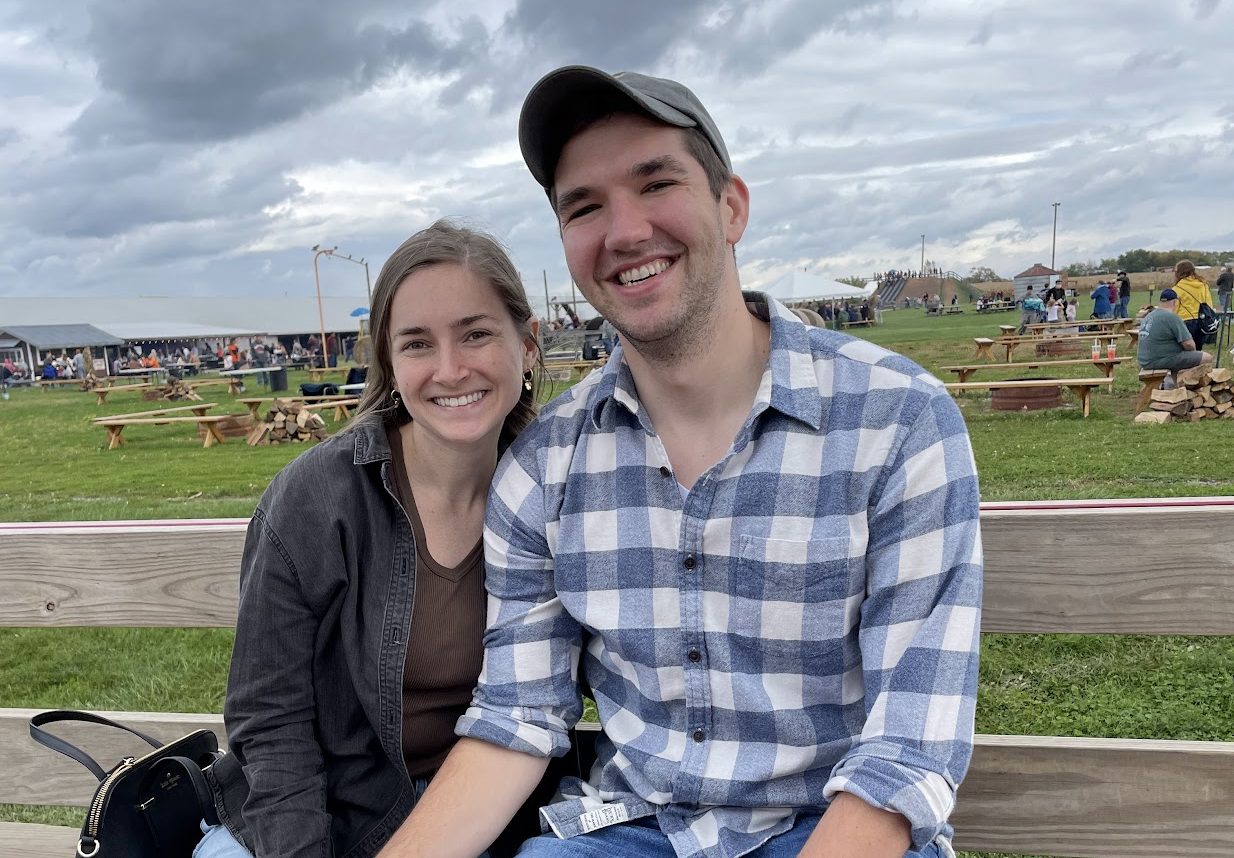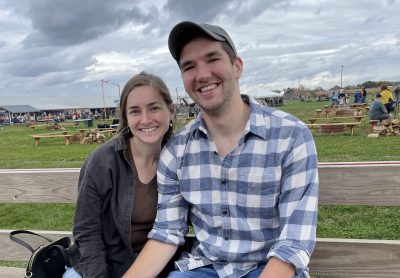Dear Dispatch members,
Thank you for all the questions you submitted to September’s Monthly Mailbag—they were incredibly thought-provoking and I had a lot of fun answering them. I got to as many as I could this time around, but always feel free to shoot me an email and I’ll do my best to get back to you. Hope you enjoy learning a little bit more about me and my work for The Dispatch; stay tuned for an update on who’ll be answering your questions in October!
Best,
Declan
Sarah: I’d be interested in learning more about how Declan got his name.
I don’t think it’ll be a surprise to anyone to find out my family lineage goes back to Ireland, so my parents were looking for names that would bring that heritage to the fore. My dad met a few Declans when he studied abroad in London, but he and my mom settled on the name when they learned the real name of one of their favorite artists, Elvis Costello, was Declan Patrick MacManus. Enter Declan Patrick Garvey.
I almost never encountered another Declan growing up, but now I feel like I share my name with every fifth toddler I bump into. (According to Behind The Name, 0.195 percent of baby boys born in 2021 were named Declan, up from less than 0.01 percent all the way back in 1995.)
LynnZ and Janet Goodwin both asked about my dogs.
Our family has had five dogs over the years: a German shepherd/border collie mix named Molly, a flat-coated retriever named Ruby, a pug named Mabel, another pug named Ozzie, and another flat-coated retriever named Phoebe. They’ve all been the best, in their own unique ways.

My fiancée and I plan on getting a puppy of our own as soon as the housing market cools off a bit and we are (hopefully) able to find a place with a yard. Let us know in the comments: pug, Bernese, husky/malamute, or golden retriever?
TV 43: What are your flashbulb memories of the Cubs winning the World Series and who was the person you called or texted first to celebrate with?
I’m guessing my wedding next year will supplant November 2, 2016 as the best day of my life, but it’ll be close. I invited any Chicagoan on campus that I could think of to a Game 7 watch party in my dorm’s common room, and proceeded to spend the next four hours and 28 minutes nervously pacing in front of the TV.
I’m grateful someone happened to be filming the crowd in the game’s final moments, because, despite being stone-cold sober, I more or less blacked out when Kris Bryant tossed the ball across the diamond to secure the final out. Apparently I threw my hands up in the air, hugged my friend John who was standing next to me, and immediately burst out in tears. I might’ve already been on FaceTime with my Dad for the whole 10th inning, but if I wasn’t, I called him immediately after. Was a really special moment.
Spent about a tenth of my 21-year-old life savings on a professional framing of the next day’s edition of the Chicago Tribune, and a quarter of what was left after that buying a plane ticket home for the victory parade. Worth it.

Ben: Looking back and looking forward, who was your favorite member of the 2016 Chicago Cubs and do you have a player/prospect you hope is the star of the next great Cubs team?
Like asking me to rank my (nonexistent) children (who are also older than me). The answer has to be Anthony Rizzo, though. His 2012 arrival in the big leagues kicked off the Theo Epstein era, and he quickly became the heart and soul of the team. Even though he’s now a New York Yankee, his charity work with the Lurie Children’s Hospital in Chicago continues to inspire.
Losing him (and Kris Bryant, Javy Báez, Kyle Schwarber, Jon Lester, Jake Arrieta, etc.) was emotional torture, but the amount of young talent the Cubs have built up in their stead has been impressive. Nico Hoerner is going to be a stud for a long time, and rookies Seiya Suzuki, Christopher Morel, Justin Steele, and Hayden Wesneski are setting themselves up for breakout seasons in 2023. Here’s hoping Brennen Davis, Pete Crow-Armstrong, Kevin Alcantara, DJ Herz, Matt Mervis, and Alexander Canario keep crushing in the minor leagues and we see them at Wrigley Field soon.
Austin, Arman, Tele, and Paul had questions about the Bears leaving Soldier Field, and Dan Davis asked if Justin Fields is a Super Bowl-caliber quarterback.
I have never had the same attachment to Soldier Field as I do Wrigley. It’s nice that it’s on the lake and has a great view of Chicago’s skyline, but it’s difficult to get to, the smallest stadium in the NFL, and somehow lacking both modern amenities and historical charm. Plus, it’s owned by the city not the team—meaning the field turf can be ruined by an Elton John concert days before a game. Let’s move to Arlington Heights and build something (with a roof) on the old racetrack lot that’s befitting the third biggest city in the country and can host Super Bowls, NCAA Final Fours, etc.
I’d have a much more optimistic take on Justin Fields if I was writing this one week earlier. I’m not out on him by any means, and still think he could become the guy, but he did not look good last Sunday against the Packers. Standing too long in the pocket, missing open receivers, hitting the wrong holes when scrambling. He’s got all the talent in the world, just needs to speed up the processing. Hope we see that today against the Texans.
Rev Julia, Bel, and 3ld3r asked about my decision to quit Twitter, whether I miss it, and what I’ve replaced it with.
My views on social media have been shaped largely by the work of Jonathan Haidt and Christopher Bail. Twitter makes you feel bad about the world, LinkedIn makes you feel bad about your career, Instagram makes you feel bad about yourself. It’s a little more complicated than that, but not much.
I’d been complaining about the brokenness of Twitter for years, but was still spending hours upon hours scrolling through my feed every day. I’d get angry at people 1,500 miles away who thrive on sparking outrage. I’d make dumb jokes to try and impress people with blue checkmarks who I’ll never meet. I’d spend half an hour going down some rabbit hole learning about that day’s “main character.” None of it mattered, none of it was real. I told myself I needed to stay on the platform for work—both to stay up-to-date on the news and promote my own stories—but that wasn’t true, I was just addicted to it.
A little more than a year ago, I quit. I’ve since built up a list of about 15 sports reporters I follow for straightforward Cubs and Bears updates—and I have to pop in to grab Presented Without Comment candidates when Esther’s not handling that section—but otherwise I do not miss the platform at all. Andrew sends me all the best memes and jokes I’ve missed, and I now get just about all my news from an RSS reader that captures, chronologically, all the stories published throughout the day by media outlets I’ve pre-selected. Still plenty of bad articles, but no algorithms pushing the most rage-inspiring headlines to the front of the line, no battling it out with trolls in the replies.
Greg and Bel had questions about how TMD comes together on a daily basis, while Patricia wondered what my sleep schedule is like and R.A. (Anne) Watman asked if I “actually have a personal life.”
Second question first. I’ve never had the greatest sleeping habits (my parents tell me I permanently gave up napping at 15 months), so I’m lucky to have found a job where that’s more of an asset than a liability. The day-to-day is highly variable depending on the topic—writing up an inflation report released at 8:30 a.m. vs. covering a presidential debate that ends at 10:30 p.m., for example. But on a typical day, I probably go to bed around 1:30 or 2 a.m. and wake up at 8 or 9 a.m. The goal is to have finished the newsletter before Steve gets up to edit it at 5 a.m., but every now and then we say hello to each other in the Google doc like ships passing in the night.
When it comes to putting TMD together, Esther and I have developed a pretty nice routine that helps ensure you’re getting the high-quality product (we hope) you’re used to every morning.
We try to plan ahead as much as possible, and there are times we know in advance what the next day’s newsletter will focus on—like if there’s an election, congressional hearing, or economic report scheduled. Other times we wake up, get to the office, and skim through the morning’s headlines to decide what we think are the one or two most important stories of the day—though those selections will occasionally be superseded by developments in the afternoon.
Once we decide on the topics and who’s going to write which, we go about the business of reporting—calling up experts, sending inquiries to government officials and agencies, etc. And as we’re doing that, we’re also going through that RSS reader, dropping links into a shared Google doc that will eventually become Quick Hits, Worth Your Time, Presented Without Comment, etc. We’ll typically break for dinner and evening activities, and get back online around 8:30 or 9 p.m. to start the editing process and put the finishing touches on the newsletter. Then we wake up and do it again!
How do I fit a personal life in there? There’s plenty of flexibility built into the schedule throughout the workday, but weekends, mostly! I take Saturday and most of Friday off because I work Sundays, and try to unplug from the news almost entirely. Don’t know that I can keep up this schedule in perpetuity, but it works for now while I don’t have kids and my fiancée is in medical school.
Eric Remcon: Now that you have a dedicated TMD teammate in Esther, will you have time to do more of the individual pieces you have done from time to time? Some examples of what I am remembering:
I hope so!
Esther was an incredible addition to the team this spring and has made TMD better in so many ways, but a daily newsletter is a two-person job—at least! That said, I had so much fun working on those stories you mentioned—as well as my profiles of Justin Amash, Tim Scott, and Virginia Ali—and plan to get back to doing that kind of stuff eventually.
Mike Kupfer had a question about how Dispatch staffers interact with the comment section.
The comment section is one of the best things about working for The Dispatch, hands down. I can’t get to every message because TMD probably averages more than 500 per day, but I always skim through in the morning and once or twice in the afternoon. Plus, CynthiaW’s Special Animal Friend of the Day is required reading.
We’re so lucky to have such a thoughtful community of readers from all walks of life. I learn something new from you guys pretty much every day—including when we made a grammatical error or need to issue a correction—and appreciate any and all pun content.
A bunch of you—Richard Kennedy, Aylene Wright, Ben Connelly, Leslie, Stephen Rankin, Sarah—had questions about my college experience: Where I went, what I studied, and how I survived four years as a conservative.
I graduated from Harvard in 2017. I had no idea I’d ever end up there—my mom’s alma mater, Notre Dame, was always my dream for college, and I went to a 3,000-person public school, not some Ivy League prep academy—but the opportunity was too good to pass up when I got that acceptance email. It wouldn’t have been possible without my parents’ support.
I spent my first semester on campus thinking I was going to concentrate (that’s Harvard’s pretentious way of saying “major”) in economics, and mapped out my schedule accordingly until I loved a statistics class so much I changed my mind. Unfortunately, it turned out I loved “introduction to statistics” much more than “the rest of statistics,” so I switched again—this time to history, my favorite subject throughout middle and high school.
That one stuck. Over the next three years, I took classes on the history of the American presidency, founding, Civil War, and social thought, as well as classes on the history of children’s literature, protest, the Midwest, and Renaissance-era Europe. My favorite course was on the rhetoric of Abraham Lincoln and Frederick Douglass.
But yes, almost all of these classes were taught by progressive professors, and for a progressive audience.
I wasn’t particularly political in high school, but I very quickly learned: Whatever most of my classmates were, I wasn’t that. I was greeted at freshman orientation by purple-haired upperclassmen holding signs like “Honk If You Hate Reagan!” and “Abolish The Patriarchy!” Within a week, I’d been scolded for (unknowingly, I promise) using problematic language like “spaz” in conversations with my peers. A professor once scoffed when I excitedly told them I had a chance to see John McCain at an on-campus event, and before Thanksgiving, the dean’s office put “social justice placemats” on tables in the dining hall providing instructions on how to talk to our uninformed relatives over the break about various hot-button social issues.
I’d be lying if I said I didn’t think about transferring once or twice early on. But I’m so glad I didn’t.
I eventually found community at St. Paul’s Parish and in a (very small) campus GOP group—that was quite a ride—but I found community with the 85 percent of my class who didn’t identify as conservative, too. One of my roommates and best friends interned for Elizabeth Warren during school, another now works in the Biden administration. We became close because we were maniacs about our hometown sports teams, liked the same kind of music and movies, and had Stat 110 together sophomore fall. We occasionally had discussions late into the night about the ideal size of the social safety net or how to prioritize environmental and economic concerns, but when we were up until 3 a.m. it was usually due to a never-ending game of spades or a Madden tournament. After telling them I was volunteering on the *gasp* Jeb Bush presidential campaign, they probably sent me a “please clap” meme and asked if I wanted to go get burritos.
I’m sure there were some people on campus who weren’t fans of mine for political reasons, but most of those suspicions can be disarmed with some empathy and a sense of humor. Find areas where you do agree, be judicious in the battles you choose, admit you’re wrong when you’re wrong. Prove to them you’re not the caricature they’ve read about in the news. Sean Hannity and Bill O’Reilly’s producers invited me on their shows a couple of times, for example—essentially to mock all the “liberal snowflakes” on campus—but I never took them up on it: These were my friends and classmates, not libs to be owned or political adversaries to be dunked on.
That said, I had no problem scrutinizing my friends’ ideologies once that trust was established. I definitely lost my fair share of debates, but my arguments were generally pretty sharp, because they had to be. Nothing forces you to think through why you believe what you believe—and discard weak arguments—like having your values challenged or questioned at every turn. If you lead with humor and some self-deprecation, you’ll be amazed at how much common ground you can find. After a few friends and I printed satirical versions of the aforementioned “social justice placemats” and hung them up around campus, Harvard retracted the originals and apologized for “fail[ing] to account for the many viewpoints that exist on our campus.”







Please note that we at The Dispatch hold ourselves, our work, and our commenters to a higher standard than other places on the internet. We welcome comments that foster genuine debate or discussion—including comments critical of us or our work—but responses that include ad hominem attacks on fellow Dispatch members or are intended to stoke fear and anger may be moderated.
With your membership, you only have the ability to comment on The Morning Dispatch articles. Consider upgrading to join the conversation everywhere.